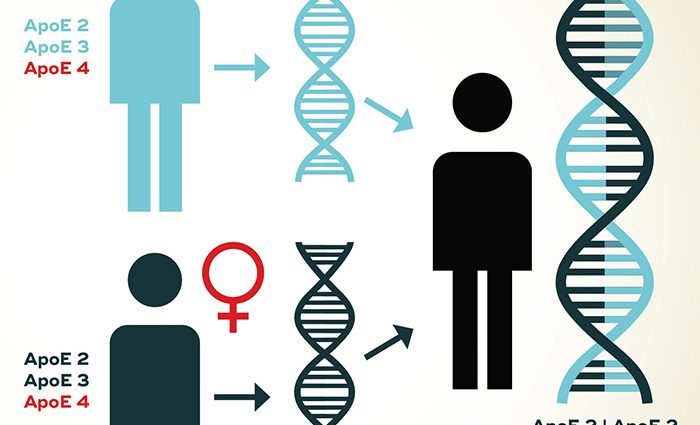If there were cases of dementia in the family and a person inherited a predisposition to it, this does not mean that one should doomedly wait until the memory and brain begin to fail. Scientists have proven time and time again that lifestyle changes can help even those who have “poor genetics” in this regard. The main thing is the willingness to take care of your health.
We can change a lot in our lives – but, unfortunately, not our own genes. We are all born with a certain genetic inheritance. However, this does not mean that we are helpless.
Take dementia for example: even if there were cases of this cognitive disorder in the family, we can avoid the same fate. “By taking certain actions, by making lifestyle changes, we can delay the onset or slow the progression of dementia,” said Dr. Andrew Budson, professor of neurology at the Boston Veterans Health Complex.
Is age to blame?
Dementia is a general term, like heart disease, and actually encompasses a whole range of cognitive problems: memory loss, difficulty with problem solving, and other disturbances in thinking. One of the most common causes of dementia is Alzheimer’s disease. Dementia occurs when brain cells are damaged and have difficulty communicating with each other. This, in turn, can significantly affect the way a person thinks, feels, and behaves.
Researchers are still looking for a definitive answer to the question of what causes acquired dementia and who is most at risk. Of course, advanced age is a common factor, but if you have a family history of dementia, it means you are at higher risk.
So what role do our genes play? For years, doctors have asked patients about first-degree relatives—parents, siblings—to determine a family history of dementia. But now the list has expanded to include aunts, uncles and cousins.
According to Dr. Budson, at age 65, the chance of developing dementia among people without a family history is about 3%, but the risk rises to 6-12% for those who have a genetic predisposition. Typically, early symptoms begin around the same age as a family member with dementia, but variations are possible.
Symptoms of dementia
The symptoms of dementia can manifest differently in different people. According to the Alzheimer’s Association, generalized examples include recurring problems with:
- short-term memory – recalling information that has just been received,
- planning and preparing familiar meals,
- paying bills,
- the ability to quickly find a wallet,
- remembering plans (doctor visits, meetings with other people).
Many symptoms begin gradually and worsen over time. Noticing them in yourself or loved ones, it is important to see a doctor as soon as possible. Early diagnosis can help you get the most out of available treatments.
Take control of your life
Unfortunately, there is no cure for this disease. There is no 100% guaranteed way to protect yourself from its development. But we can reduce the risk, even if there is a genetic predisposition. Research has shown that certain habits can help.
These include regular aerobic exercise, maintaining a healthy diet, and significantly limiting alcohol consumption. “The same lifestyle choices that can protect the average person can also help people at increased risk of dementia,” explains Dr. Budson.
A recent study of almost 200 people (mean age 000, no signs of dementia) looked at the association between healthy lifestyle choices, family history, and dementia risk. The researchers collected information about the participants’ lifestyles, including exercise, diet, smoking, and alcohol consumption. Genetic risk was assessed using information from medical records and family history.
Good habits can help prevent dementia – even with unfavorable heredity
Each participant received a conditional score based on lifestyle and genetic profile. Higher scores were correlated with lifestyle factors, and lower scores were correlated with genetic factors.
The project lasted over 10 years. When the average age of the participants was 74, the researchers found that people with a high genetic score — with a family history of dementia — had a lower risk of developing it if they also had a high healthy lifestyle score. This suggests that the right habits can help prevent dementia, even with unfavorable heredity.
But people with low living standards and high genetic scores were more than twice as likely to develop the disease than people who led a healthy lifestyle and showed a low genetic score. So even if we don’t have a genetic predisposition, we can exacerbate the situation if we lead a sedentary lifestyle, eat an unhealthy diet, smoke and/or drink too much alcohol.
“This study is great news for people with dementia in the family,” says Dr. Budson. “Everything points to the fact that there are ways to take control of your life.”
Better late than never
The sooner we start making changes to our lifestyle, the better. But the facts also show that it’s never too late to start. Plus, there’s no need to change everything all at once, Dr. Budson adds: “Lifestyle changes can take time, so start with one habit and focus on it, and when you’re ready, add another one to it.”
Here are some expert suggestions:
- Quit smoking.
- Go to the gym, or at least start walking for a few minutes every day, so that over time you can spend at least half an hour daily doing it.
- Cut down on alcohol. At events, switch to non-alcoholic drinks: mineral water with lemon or non-alcoholic beer.
- Increase your intake of whole grains, vegetables and fruits, nuts, beans, and oily fish.
- Limit your intake of processed meats and foods made with saturated fats and simple sugars.
Agree, following the recommendations of doctors is not the highest price to pay for the opportunity to remain sane and enjoy the age of maturity and wisdom.
About the Author: Andrew Budson is a professor of neuroscience at the Boston Veterans Health Complex.










